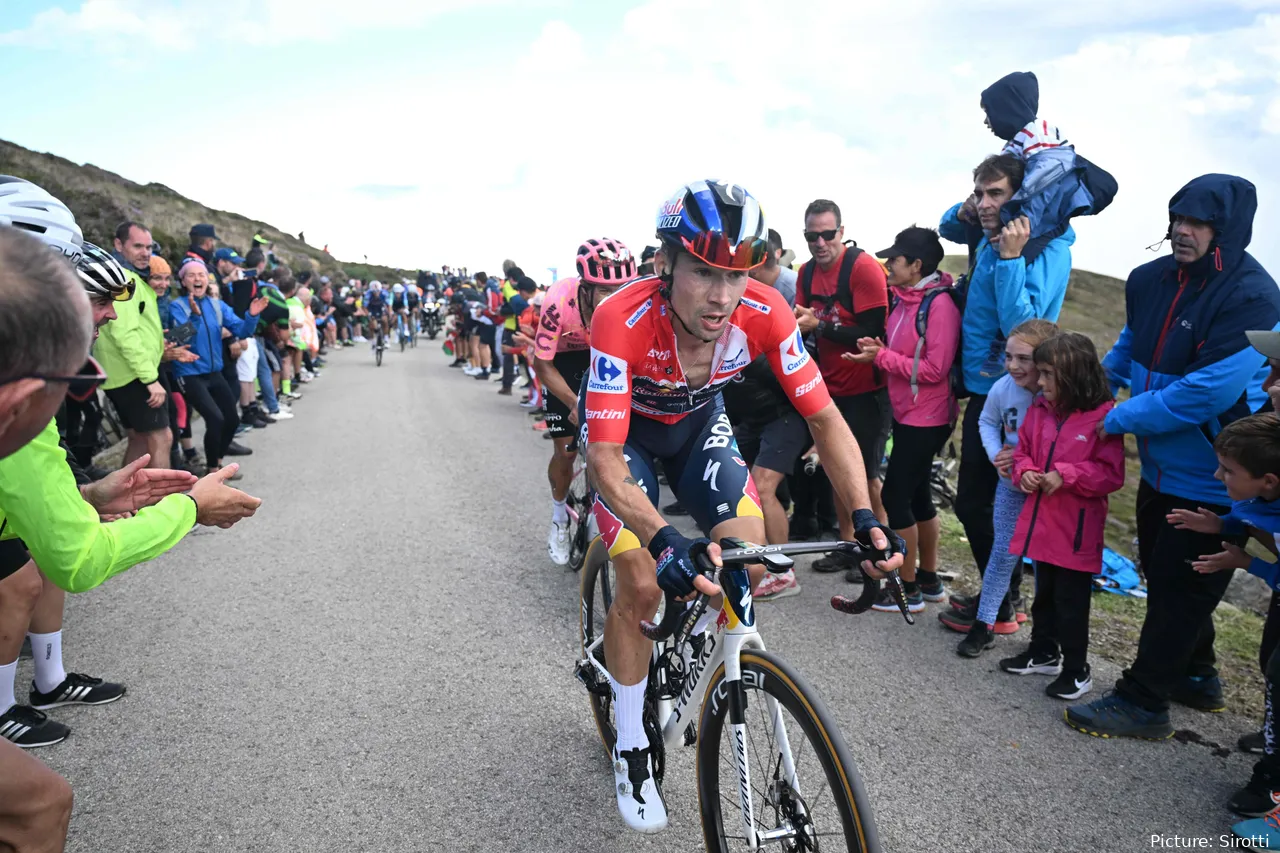Other News
Examining what Red Bull, Bora, and Hansgrohe say It’s possible for Primoz Roglic to win the Tour de France, but why do historians say that?
There’s no question that Primoz Roglic’s first season with Red Bull–Bora–Hansgrohe went well. The Slovenian won the Vuelta a España for the fourth time in his amazing career in his first season after leaving Jumbo Visma. He also won the Criterium du Dauphine. A season in which they win those two races in the same year would be the best of their careers for 99% of the riders in the field. Of course, Tadej Pogacar won the triple crown in 2024, which was widely regarded as one of the best seasons ever.
In fact, Roglic had a great year. But doesn’t this story seem like one we’ve heard before? Roglic is in great shape going into the Tour de France. He crashes at the Tour de France, but wins the Vuelta to save his season. Yes, it does sound like something we’ve heard before. That doesn’t take away from Roglic’s year, but he needs to hurry if he ever wants to win the Tour de France, which is the only thing that’s missing from his resume.
Head of performance for Red Bull, Bora, and Hansgrohe Dan Lorange recently told Velo that even though Primoz Roglic is 35 years old, he still thinks that he can get better. “Primoz can still be there with Pogačar and Evenepoel,” he said. If we do the right things to build him up and get him ready, why can’t he?
“We can see that Primoz’s numbers are still good, if not better.”
Some people will find these words strange, but are they really true? Roglic would love to be in a four-way race for the Tour de France next year, with Tadej Pogacar, Jonas Vingegaard, and Remco Evenepoel also in the running.
This piece will talk about how age affects cycling and what other sports stars Roglic’s age or older have done to reach the top of their fields.
What does age have to do with it?
Because cycling is so hard on the body, age is very important in competitive cycling. When cyclists reach their best performance, which usually happens between the late 20s and early 30s, they have the most endurance from years of training and their bodies are at their strongest. As people get older, their VO2 max, healing speed, and muscle power tend to decrease. This makes it harder for older riders to keep up their best performance.

Cycling not only changes your body, but it also challenges your mind. With more experience, riders are often better able to deal with the stress of racing, stay focused on long stages, and use precise tactics. This can give older riders an advantage in some situations. But races that last more than one week, like the Tour de France, can show any physical decline because they are so hard to heal from. Family is another thing that can come into play. As riders get older, they may have more people to take care of, which may be more important to them than pushing their bike to its limits.
Even with these problems, current nutrition, training, and recovery technologies have helped many cyclists stay competitive for longer. Riders like Primoz Roglic, who is 35 years old but still a top contender, show that age doesn’t have to be as much of a problem as it used to be. Still, time is always a factor, and for Roglic, the question is whether he can use the years he has left to finally win the Tour de France.
Who has won the Tour de France the oldest?
Any age can win the Tour de France, but some riders have done it later in their lives, going against the odds and what people expect from the sport. Firmin Lambot, who won the Tour in 1922 at the age of 36 years and 4 months, is the oldest winner in the event’s history. Roglic will be a little older than Lambot when the Tour starts next year. Lambot’s win is still one of the most amazing things in the history of the sport, even though it happened in a time when roads and tools were not nearly as good as they are now.
These days, age is even more important because riders want to improve their ability by every little bit. It was 34 years old for Cadel Evans to win the Tour in 2011. He is the oldest winner of the decade. It took Evans years of close calls before he finally won, and he fully earned the yellow jersey when he finally got it. Many people were inspired by his success, which showed that riders in their mid-30s could still fight at the highest level.
There haven’t been many older winners of the Tour de France, but riders who have been in other Grand Tours have done amazing things. This is best shown by Chris Horner, who won the 2013 Vuelta a España at the age of 41, making him the oldest rider to ever win a Grand Tour. Horner’s win, in which he beat competitors who were decades younger on the hills, proved that it was still possible to win a grand tour in your 40s.
Topend Sports has found that the average age of Tour winners over the years is between the late 20s and early 30s. This trend shows the balance between the benefits of being young and having endurance and knowledge gained from years of racing professionally. And even though Primoz Roglic is a little older than most golfers, it’s still possible that he could win the Tour.
Individual sports winners from the past
Athletes have beaten the odds in more than one sport to reach the top of their fields, and cycling is just one example. There are many individual sports where older athletes have risen to the top and shown younger athletes that they can still do it.
In boxing, George Foreman successfully won back the heavyweight title in 1994, when he was 46 years old. When he fought Michael Moorer, who was 19 years younger than him, Foreman stunned him with a knockout that made history. Even more amazing was the fact that Foreman won 20 years after losing the title!
Linford Christie won the 100-meter sprint at the 1992 Olympics in Barcelona, Spain. He was 32 years, 3 months, and 30 days old, making him the oldest Olympic winner in this event. Christie’s win in an event that is usually dominated by much younger athletes and is known for being very physically demanding showed that it is possible to break physical stereotypes at the top level of sports.
There have also been older tennis champions. Serena Williams, for example, kept playing at the top level well into her late 30s. Ken Rosewall won the Australian Open in 1972 when he was 37 years old. His story may be the most moving one.
These examples from different individual sports show that age is just a number and can be changed by things like experience, strategy, and the study of sports. Primoz Roglic sees these players’ success as a sign that he can still win the Tour, even though the years are passing. Even though Tadej Pogacar, another Croatian rider, is probably a bigger problem right now than Roglic’s age, you still can’t write off the four-time Vuelta winner going into 2025.
-

 Manchester City10 months ago
Manchester City10 months agoWatch Manchester City best Midfielder Kevin De Bruyne angry expression with Pep Guardiola substituting him in the 68th minute of the match vs Liverpool
-

 Other News1 year ago
Other News1 year agoReason why Liverpool player Darwin Nunez was held back by Jurgen Klopp from angryily attacking Pep Guardiola after the final whistle during the match
-

 Arsenal9 months ago
Arsenal9 months agoReason why Bukayo Saka might be forced to retire from football before he turned 24-year-old
-

 Manchester United9 months ago
Manchester United9 months agoMain reason Amad was sent off during Manchester United vs Liverpool FA Cup quarter-final match
-

 Arsenal1 year ago
Arsenal1 year agoI begged Him to go with Arsenal, but He went with Man United instead of us. William Saliba announced that his £45 million international teammate had chosen to join Man United over Arsenal on a personal basis.
-

 Liverpool9 months ago
Liverpool9 months agoBetween Liverpool, Manchester City and Arsenal Ian Wright reveals the club who will win the Premier League title this season
-

 Liverpool10 months ago
Liverpool10 months agoManchester City manager Pep Guardiola break silence and make responds to Kevin De Bruyne “not impressive angry behaviour” after Man City vs Liverpool substitution
-

 Manchester United1 year ago
Manchester United1 year agoWatch Goal Video: Manchester United vs Everton – Alejandro Garnacho scores the best goal of the year with a back flip
